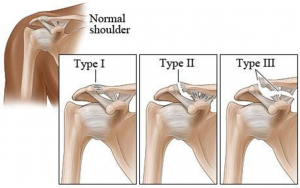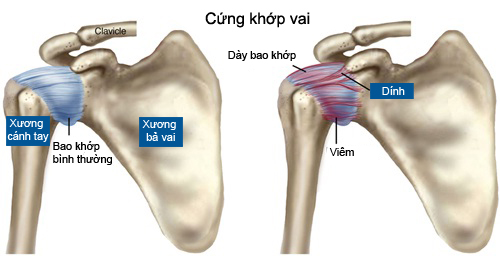FROZEN SHOULDER
.jpg)
Frozen shoulder syndrome, or adhesive capsulitis as it’s medically termed, occurs when ligaments around the shoulder joint swell and stiffen to such an extent that normal healing doesn't take place. This makes it difficult to move the shoulder, making everyday activities such as getting dressed or reaching for a cup from a shelf painful. As the condition progresses, the stiffness may continue to the point where range of motion can be severely limited.
Research has shown that diabetes patients are more than twice as likely to suffer with condition, and other risk factors include recent surgery, having a stroke, overactive or underactive thyroid and heart disease.
If you suspect that you have frozen shoulder, see your GP for a diagnosis. Your doctor should also rule out shoulder arthritis via a scan or X-ray, as it produces similar symptoms. With frozen shoulder the surfaces of your shoulder joint are normal and motion is limited because the tissues surrounding the joint have become tight, preventing you from moving your arm and shoulder as you usually would. With shoulder arthritis the joint surface is damaged.

Possible causes of frozen shoulder
FROZEN SHOULDER
Frozen shoulder syndrome, or adhesive capsulitis as it’s medically termed, occurs when ligaments around the shoulder joint swell and stiffen to such an extent that normal healing doesn't take place. This makes it difficult to move the shoulder, making everyday activities such as getting dressed or reaching for a cup from a shelf painful. As the condition progresses, the stiffness may continue to the point where range of motion can be severely limited.
Research has shown that diabetes patients are more than twice as likely to suffer with condition, and other risk factors include recent surgery, having a stroke, overactive or underactive thyroid and heart disease.
If you suspect that you have frozen shoulder, see your GP for a diagnosis. Your doctor should also rule out shoulder arthritis via a scan or X-ray, as it produces similar symptoms. With frozen shoulder the surfaces of your shoulder joint are normal and motion is limited because the tissues surrounding the joint have become tight, preventing you from moving your arm and shoulder as you usually would. With shoulder arthritis the joint surface is damaged.
Possible causes of frozen shoulder
Because frozen shoulder is a catch-all term, one person's symptoms and causes might be slightly different from another's, making it difficult to say what has caused the problem.
Frozen shoulder does, however, seem linked to certain activities. For example, any activity that involves you having to rotate your arm, such as freestyle swimming or throwing a ball overarm (for cricket, for example). Also, overhead weight lifting and sudden stress to the shoulder muscles via injury.
It's thought that frozen shoulder is caused by inflammation in the joint - this inflammation could arise after an injury but also as a side effect of other illnesses, such as diabetes, a known risk factor for frozen shoulder.
Early symptoms of frozen shoulder
- A feeling of pain and tightness in the shoulder area.
- A feeling of tightness especially when putting the arm up and back, as you would do it you were throwing a ball overarm.
- Pain on the back of the wrist. (This specifically relates to frozen shoulder caused by subscapularis trigger points.)
- As time goes on, the symptoms will worsen although the pain may be reduced.
- Developing a frozen shoulder is usually a major cause of concern worry for anyone unfortunate enough to experience this condition.
- Aside from the restricted mobility and discomfort experienced, on performing the most mundane of tasks including driving, dressing, sleeping etc… the symptoms may be experienced for extended periods of time.
- The generally accepted definition of a frozen shoulder is where abnormal bands of scar tissue forms in the fibrous capsule surrounding the shoulder joints causing it to thicken and contract. This in turn restricts movement and causes pain. There is often a trauma or sprain of the joint capsule associated with the condition.
Frozen Shoulder – Diagnosis in Western Medicine
A physical examination to test the range of movement including active and assisted tests (passive) is usually performed. Palpation of the shoulder is used to determine the severity of the pain and its cause. Often swellings, muscle wasting and bruising will be assessed at the same time. It has been found that people suffering from diabetes are more likely to develop frozen shoulder, so a blood test may be taken. An MRI scan will show any thickening or scarring of the tissues within the joint capsule, and an x-ray, if offered, is used to determine whether or not the shoulder problem is coming from a degeneration of the bones. A sports injury where there is repeated tearing of the soft tissues surrounding the joint capsule occurs, shoulder surgery leading to the formation of adhesions and of scar tissue forming from a sports injury are often causes of frozen shoulder.
Frozen Shoulder – Diagnosis in Chinese Medicine
The primary issue from a Chinese medicine viewpoint is to discover whether the problem has been caused internally from emotional issues, externally from injury, sprain or poor posture, constitutionally from an underlying weakness or from a mixture of these things. In most cases there will be a stagnation of Qi and Blood which will be determined through palpation of the arm, chest, shoulder and back muscles. If there is heat (the tissues feel warmer than the unaffected tissues) then this will need to be cleared, Cold will need to be scattered (the nature of Cold may be felt by discovering that warmth makes the condition better), Damp is usually indicated where stiffness of movement is more prevalent than the pain. It is not unusual to discover a mixture of conditions contributing to the issue. Pulse and tongue Gonitis is a kind of retrograde disease, usually seen among middle-aged and old people. The clinical manifesta-tions are pain and swelling of the knee joint, aggravation in walking, relief after rest, appearance of frictional sound in movement, stiffness of the joint after long-term sleeping or sitting or standing (which can be relieved gradually after relaxation), mild exudates from the joint cavity in severe cases or even evident swelling due to hemorrhage from the joint cavity. The symptoms in the late stage are restricted movement of the knee joint, dis-use atrophy, or even inversion or eversion of the knee. Gonarthritis pertains to the conception of obstructive syn-drome in TCM due to insufficiency of liver and kidney, malnutrition of tendons and bones and obstruction of the meridians by pathogenic wind, cold, dampness and heat in the aged; or due to production of phlegm resulting from spleen asthenia and migration of phlegm and dampness in the meridians; or due to long-term stagnation of blood vessels and retention of blood stasis in the joints.
[Syndrome differentiation]
Pain, swelling, aching weakness, unsmoothness of the knees that become aggravated with cold and relieved with warmth; stiffness of the knees after long-term duratiom muscular atrophy; or accompanied by aching or pain of the waist, vertigo, tinnitus and fatigue.


